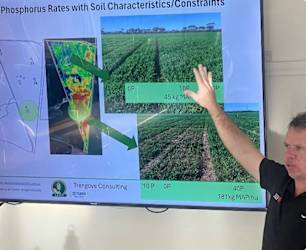A PROPOSED study by the University of Adelaide will investigate if mixing a variety of compounds, including biserrula, into cow feed containing seaweed, can reduce the amount of methane produced by livestock.
Biserrula is a persistent pasture legume grown in Mediterranean farming systems, while other compounds include by-products, grains and unsaturated fatty acids.
The study will also breath test livestock to record methane levels using a low-cost device, making it more accessible for farmers.
The Commonwealth Government has supported the testing, by providing $1.075m in funding for the project through the Methane Emissions Reduction in Livestock (MERiL) program.
The burps and farts of cows produce methane, a greenhouse gas with 21 times more global warming potential than carbon dioxide, and accumulates in the atmosphere at the rate of 1 per cent each year.
Dr Mariana Caetano, lecturer in Animal Nutrition and Metabolism at the University of Adelaide, was eager and ready to investigate the role of other feeds in combination with seaweed in reducing methane emissions, and its impact throughout the production cycle of beef cattle.
This includes the effect of a low-dose seaweed supplementation given to pregnant cows and the long-term impact it has on methane emissions of calves.
“This project aims to trial and demonstrate innovative and cost-effective on-farm practices of reducing methane emissions throughout the production cycle considering low labour input on-farm,” Dr Caetano said.
“Biserrula and seaweed supplements will be used during times of feed shortage and low-feed digestibility.
“Many other feeds that contribute to reducing methane will also be fed in combination with seaweed to reduce methane emissions in growing and finishing steers under intensive and extensive systems.”
Direct livestock emissions make up for around 15 per cent of Australia’s greenhouse gas emissions.
“This project will provide new insights into seaweed supplementation throughout the beef cattle production cycle in southern Australia,” Dr Caetano said.
“(It) will demonstrate different approaches that can be used to reduce methane emissions in livestock.”
The project builds on Dr Caetano’s previous research projects on seaweed supplementation of pregnant cows and the comparison of two devices to measure methane in livestock funded by the Innovation hub.






